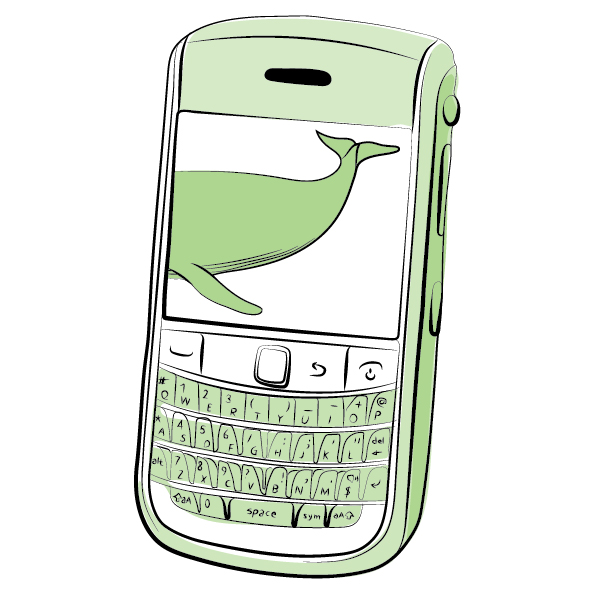
The BlackBerry and the white whale
There’s a 2010 commercial for the BlackBerry Torch that retells Moby-Dick through a stream of websites, social media posts, and video clips. It opens optimistically, with a shot of a phone screen revealing the following message: “AT&T and BlackBerry tell a whole new story.” This claim is false, of course, as we learn immediately. A rapid montage on the phone’s screen tells the decidedly non-new story of Moby-Dick through loosely pertinent snippets of images, text, and music. The nineteenth-century whaling industry’s data-rich sea has become the data-rich realm of the internet: a compulsive phone user looks at a title screen for Melville’s novel, then decides to play Moby’s 2002 song “We Are All Made of Stars.” (Moby is supposedly Melville’s great-great-great grandnephew.) Soon we see a clip from Jimmy Neutron in which a character demands to be called Ishmael. The ensuing sequence culminates in a stop-motion swipe-through of a whale crashing through a ship, followed by “The End,” and finally our phone floating over a blank background.
Near the conclusion, lyrics from the Moby song—“People, they come together”—imply that the content accessed through the BlackBerry facilitates joyful union. Indeed, in the commercial, networked people seem to link happily to one another by sharing experiences of art. There are passages in Moby-Dick that also suggest such amiable connections amid a network that sustains a welter of data: the network of oceanic business channels whalers into each other’s proximity, but art is what brings them together. “Be cheery, my lads!” sings one character. “May your hearts never fail!” Whereupon “all follow” in joyous song. Ishmael (the narrator) and the harpooner Queequeg enjoy one another’s company while Ishmael watches Queequeg whittle. Even basic handiwork aboard the Pequod, the novel’s focal ship, has a salutary communal effect. When a whale hunt ends, and all aboard become absorbed by their shared work of whale-oil processing, Ishmael acknowledges that “an abounding, affectionate, friendly, loving feeling did this avocation beget.” At such times of utopian fraternity among the Pequod’s crew, we find sunny possibilities for people coming, artfully, together.
Still, the conclusion of the BlackBerry commercial’s adaptation—the phone’s final position in a field of emptiness—suggests a bleaker possibility: that we can lose our bearings while connecting with others through art; that compulsively following a trail of connections can bring us to a place...
You have reached your article limit
Sign up for a digital subscription and continue reading all new issues, plus our entire archives, for just $1.50/month.
Already a subscriber? Sign in




